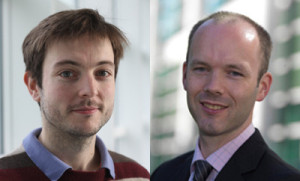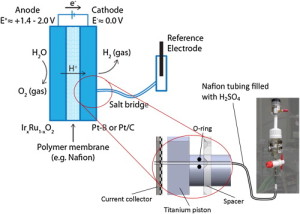
Brightman (left) and Hinds (right) have developed a novel electrode to boost green hydrogen research.
Image: National Physical Laboratory
ECS members Edward Brightman and Gareth Hinds of the National Physical Laboratory have developed a novel reference electrode that will aid in the development of hydrogen production technologies for renewable energy storage.
Both Brightman and Hinds will present their work on reference electrodes at the 227th ECS Meeting in Chicago this May. (Get an advanced look at that presentation here.)
Brightman and Hinds’ work deals with polymer electrolyte membrane water electrolysers (PEMWEs), which convert electricity and water into hydrogen and oxygen using two electrodes separated by a solid polymer electrolyte. While scientists have been looking and PEMWEs as a promising technology for some time now, researchers have been stifled in utilizing them due to the expensive catalyst materials needed and the general poor understanding of the degradation of these catalysts.
Now, Brightman and Hinds have tackled this issue by finding a way to produce PEMWEs with a cost-effective design and extended lifetime. This development allows for in situ measurement of the electrochemical process at the anode and the cathode.
This from National Physical Laboratory:
Conventional reference electrodes either connect to the edge of the cell under test, leading to significant measurement errors arising from edge effects, or require special modifications to be made to the PEMWE’s design, making them difficult to incorporate. NPL’s reference electrode avoids these problems by connecting directly to the active region of the cell through holes drilled into the end plates of the cell. This allows the reference electrode to determine the contributions of the anode and the cathode to the cell voltage, without affecting the cell’s performance.
This new development could be coupled to renewable energy sources to generate hydrogen for efficient energy storage and low-carbon transportation.
Get all the details of their research in “In situ characterisation of PEM water electrolysers using a novel reference electrode.”
Make sure to join Brightman and Hinds, and other brilliant scientific minds by becoming a member of ECS today!


